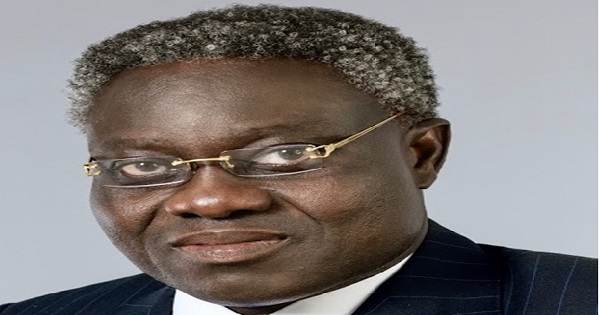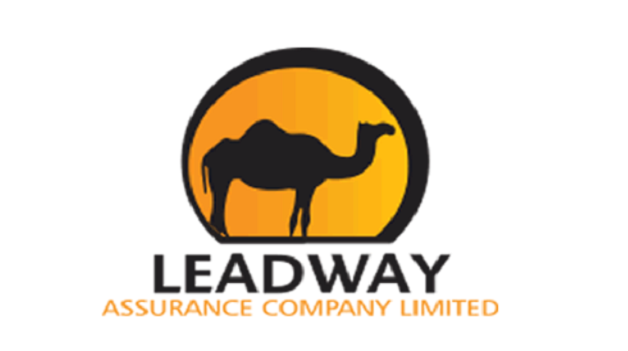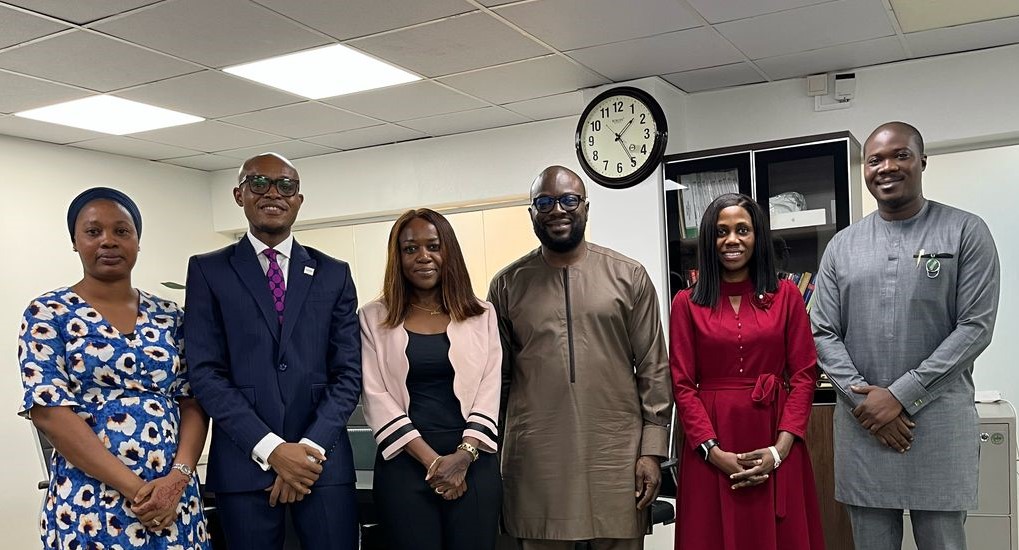E-Financial
Phillips Oduoza: Inspirational Giant of Banking Industry

Phillips Oduoza, founder and chairman, NOVA Merchant Bank Limited is inspired by Nigeria’s future, which he believes holds potential waiting to be harnessed.

Phillips Oduoza
NOVA Merchant Bank offers an integrated suite of financial solutions covering Wholesale Banking, Investment Banking, Asset Management, Wealth Management, Trade Services, Transaction Banking, Cash Management and Digital Banking.
Phillips, also former group managing director (GMD), United Bank for Africa (UBA), is gifted, a deep thinker, selfless with a knack for seeing what others couldn’t see and making the seemingly impossible possible in addition to great leadership skills.
In this article, we will look at his new bank, banking career, his leadership skills and background.
NOVA Merchant Bank
NOVA Merchant Bank founded by Phillips is a licensed merchant bank with a focus on wholesale and investment banking.

The bank which began operation in 2018- became an instant success and broke-even in the first year of operations.
Recall at the time of commencement of operations by NOVA Merchant Bank, the economic environment was quite challenging, because the country just exited from recession.
Secondly, there was still turbulence in the industry resulting from interventions in some banks by the Central Bank of Nigeria (CBN).
But the new bank’s growth trajectory has also continued as it reported a profit after tax of N3.49bn for the financial year ended December 31, 2020.
This represents a 112% increase when compared to N1.65bn in 2019.
All the key financial parameters recorded major improvement over the prior year performance; Gross Earnings showed a quantum leap of 130% growth over 2019 and Profit Before Tax at N3.52bn recorded a 135% growth over the 2019 figure of N1.5bn.
The bank achieved such growth amidst the unprecedented nature of the COVID-19 pandemic and resulting macro-economic headwinds.
Also, the Nigerian Exchange Limited (NGX) recently admitted the bank’s N10 billion bond on its platform.
The bank made history as the youngest merchant bank to issue a bond in Nigeria which also oversubscribed by 300 per cent
The success of the bond is an indication of the level of investor confidence in the bank’s reputation, brand and corporate performance.
Banking Career
Phillips started his banking career in 1989 with Citibank as the first set of Executive Trainees where he trained in every aspect of banking after a brief stint with International Merchant Bank (IMB) as a Credit Officer in 1987.
Within the three years at Citibank, he was equipped with knowledge of banking operations, relationship management, credit/marketing, efficient implementation of technology, risk management and lean banking methods.
He moved from Citibank to Diamond bank in 1991, as one of the pioneer staff who built the bank to become a strong and notable brand in the industry.
Phillips rose through the ranks to become an Executive Director, serving as ED, Operations and Technology (1999-2002) the period where most banks had to do the IT transformation to meet up with global standards and practices.
He was also Executive Director, Commercial/Retail Banking from 2002 to 2004.
His next stop was at the Reliance Bank Limited where he had a blinking stint as Deputy Managing Director for 4 months before moving on to join the Management and Board of Standard Trust Bank PLC in December 2004.
He was with STB at the time of the merger with UBA and became a key player in the new UBA, rising through the ranks to serve two terms as MD/CEO before his retirement in 2016.
He was succeeded by Kennedy Uzoka.
Leadership Skills
Phillips is a consummate banker with limitless energy who believes in team work.
He is hard worker who avoids shortcuts and do not jump leadership ladder.
He possess the Midas touch, everything he touches turns into gold
Phillips has mentored and is mentoring crops of young bankers and entrepreneurs.
He is also my benefactor.
Tony O. Elumelu, chairman, United Bank for Africa (UBA), described Philips as “a man with a very cerebral mind, very diligent, loyal and astute”
He is man who loves and encourages progress and a man who always works for the best of everything.
Elumelu said that the performance of UBA today, both financial and brand management are all attributable to Philips and all the team he worked with.
Alex Otti, former CEO of Diamond Bank Plc, praised Philips for his extra-ordinary talent and management skills and leaving the banking industry with his integrity intact.
Philips has won several awards and is one of the most popular bankers in the continent of Africa.
In 2013 and in 2015, he emerged as the Africa investor (Ai) Socially Responsible Investment (SRI) 30 CEO of the year.
He currently serves on the boards of Veritas University Abuja, Lagos State Security Trust Fund, and the Development Bank of Nigeria.
Philips has also served on several boards including Interswitch Plc (representing UBA), Valuecard Plc (Unified Payment Services Plc), Nigeria Interbank Settlement System, Nigeria Economic Summit Group, Financial Markets, and Dealers Quotations (FMDQ).
Background
Phillips was born into a large family in Owerri, Imo state Nigeria.
He attended St. Kelvins Primary School, Owerri, and Government College, Owerri before moving down to Lagos state for his university education.
He bagged a Civil Engineering degree (with First class honours) from the University of Lagos.
He was intelligent and excelled in his studies.
According to Phillips, he never considered banking or accounting in his first degree because he did not want a sedentary career.
Instead, he wanted a career in civil engineering where he felt he would be more actively engaged.
“As a student, I was very proficient in science subjects,” he recalled, “and I could have studied Medicine or any other such course. However, I wanted a profession that is involved in physical activities, as against research. That was why I chose to study engineering because it has physical applications. As a civil engineer, you are involved in building roads, bridges, houses and so many diverse things.”
However, in the course of his engineering study, he took a couple of courses that were business-related and his interest was piqued.
After school, he considered several career options before eventually settling for banking, and this became the epicentre of his entire career.
He went back to UNILAG and obtained an MBA in finance to guide his new career path.
Since then, he has attended numerous banking, management and leadership courses including the Advanced Management Programme of the Harvard Business School.
He is an honorary fellow of the Chartered Institute of Bankers.
E-Financial
Leadway Partners Firm to Launch Retail Insurance Product for Women

In line with passion and aspiration of the National Insurance Commission (NAICOM) to achieve financial inclusion among Nigerians especially Nigerian women, Leadway Assurance, has partnered with Wafira Ntaba Limited a marketing firm to launch a bespoken insurance policy for Nigerian women.

The product, Leadway Plan B Insurance policy, comes in simplified and affordable packages for as low as N26,000 per quarter, broadening financial inclusion and income protection for women-led small to medium-sized enterprises and lifestyle protection for women across different social strata in Nigeria.
Speaking at the media launch of the product, Leadway ‘s Director Sales, Retail and Partnership, Kike Fischer, shed light on the market approach for the Plan B product, saying “one uniqueness of the Plan B product is in its single-wide coverage from risks and perils related to auto insurance, healthcare, personal accident, fire, burglary, life insurance and education cutting across its different product packages – SME, Corporate and Premier packages.”
Also speaking, the visioner behind the Plan B Insurance for Nigerian women, Ayona Aguilera Trimnell shared the inspiration behind the products saying, “Plan B is an idea that has been in development for 10 years.
“As I began exploring insurance products aimed at women in other countries, I recognised the need for an insurance product that promotes financial inclusion in Nigeria, specifically for women. I believed we could create something that addresses their unique concerns.
Women need to understand how insurance can alleviate their worries and the benefits of being insured. I have personally enjoyed the advantages of insurance for over fifteen years, and I believe other women should have the opportunity to experience the same benefits.”
She said both partners could simplify the benefits of the plan B insurance product to help even the uneducated, understand and be convinced to secure their future by becoming a policyholder.
According to her, it has been proven and tested that women too buy insurance, but more women need to be aware and get insured.
On the market approach for the Plan B product, she said she was confident that these products would help women of all classes in Nigeria create and protect wealth, recover from economic challenges, pursue their purposes, and lead their families with peace of mind.
E-Financial
Sage Grey Finance Partners with Bank of Industry to Empower MSMEs in Nigeria

Sage Grey Finance Limited has joined forces with the Bank of Industry to provide accessible and affordable financing solutions for Micro, Small, and Medium Enterprises (MSMEs) in Nigeria.
This partnership, announced in Lagos, aligns with the Federal Government’s MSMEs Fund and aims to bridge the $236 billion funding gap faced by small businesses, fostering economic growth and job creation.
Eligible MSMEs can access loans of up to ₦5 million at a competitive 9% annual interest rate, with loan processing completed within five working days.
The initiative also includes SME advisory services to equip businesses with tools for sustainable growth.
Executive Director Jumo Atiba emphasized the critical role of MSMEs in national development, highlighting the partnership’s potential to stimulate entrepreneurship and unlock grassroots economic potential.
This collaboration reflects Sage Grey Finance’s commitment to financial inclusion and sustainable development.
The partnership builds on Sage Grey’s history of impactful initiatives, including a $200 million gas processing plant project and youth empowerment programs.
By addressing the challenges of financial exclusion, this collaboration is set to drive inclusive economic progress across Nigeria.
E-Financial
Four Red Flags Nigerians Ignored until CBEX Crashed- DUBAWA

It has not been a pleasant week for thousands of Nigerians who have again fallen for another money scam.

According to DUBAWA, a West African independent verification and fact-checking project, several persons on various social media platforms have begun to count their losses as CBEX, a popular digital asset trading platform, reportedly wiped out over N1.3 trillion from Nigerian investors’ accounts.
The platform collapsed after funds disappeared from users’ wallets, withdrawals were postponed, and communication channels were locked.
Taiwo Owolabi, a security analyst, recently released an analysis showing how investors’ funds were diverted through funnel wallets and finally into a central wallet, which now holds a total of $857 million in USDT.
The security expert concluded that CBEX was just another Ponzi scheme.
When CBEX promised a mouth-watering 100 per cent return on crypto investments in 30 days, many Nigerians rushed to invest just like they did with the defunct MMM.
However, despite the crash, CBEX has asked some investors to pay $100 and $200 verification fees to access partial withdrawals.
Now that the chips are down, it’s time to ask: “How did we not see this coming?”
Below are four red flags about CBEX that investors ignored.
- No regulatory approval
CBEX operated without registration or approval from the Securities and Exchange Commission (SEC) or the Central Bank of Nigeria.
Still, many Nigerians invested, assuming legitimacy because the platform looked flashy. This has become a pattern, as in previous cases where Nigerians got duped, the platforms were unregistered.
SEC has since warned Nigerians against investing in unregistered online forex and digital asset platforms, saying that operating such businesses without registration is now illegal under the new Investment and Securities Act (ISA).
Lesson: Always verify a platform’s regulatory status before putting your money in.
- Anonymous founders
CBEX’s website and Application did not list identifiable owners or executives. To gain credibility, CBEX masqueraded as a crypto platform, talking about “blockchain,” “trading bots,” and “AI-powered systems.” However, it had no verifiable trades or links to legitimate crypto exchanges. It used tech jargon to mislead its users.
Lesson: Transparency is a minimum requirement. If you don’t know who runs it, don’t trust it.
- Unrealistic returns on investment, withdrawal issues
While there is no ideal return on investments (ROI), excessively high ROIs or ones that appear too good to be true are usually a call for caution.
CBEX promised investors returns of up to 100 per cent in 30 days. That looks like a classic Ponzi red flag.
As seen in the past, these kinds of returns are unsustainable, but they remain effective bait that can appeal to anyone’s greed.
At first, CBEX worked. Users were getting paid even though Owolabi claimed the platform initially used one investor’s money to pay another until it could not.
Just before the crash, many users reported delays in withdrawing their funds. CBEX blamed this on “system upgrades” and “network issues,” which is a tactic common with failing schemes.
Lesson: High, guaranteed returns are a red flag, and consistent withdrawal delays indicate that the system is drying up. That’s usually when the exit strategy begins.
- Influencer endorsements and peer pressure
The Fear Of Missing Out (FOMO) does not respect age, especially when influencers, friends, and families are involved. However, the misuse of trust through misinformation is common in fraud schemes.
CBEX’s biggest marketing weapon was social media hype and word-of-mouth pressure. The platform relied heavily on trust networks.
From WhatsApp statuses to Facebook pages and TikTok videos, CBEX grew viral through a coordinated network of testimonials. People shared real and fake proof of payment screenshots and emotional success stories.
When friends and family members innocently vouched for it, people ignored other red flags and pumped money into the scheme.
Lesson: Social proof is not due diligence. Always investigate platforms independently, even if people you trust are involved.
Conclusion
CBEX’s collapse is not new; unfortunately, it may not be the last. DUBAWA urges investors to adopt a fact-checking mindset when approached with financial opportunities. Scams thrive on ignorance and trust. Our best defence is verification, not hope.
DUBAWA is a West African independent verification and fact-checking project, initiated by the Centre for Journalism Innovation and Development (CJID) and supported by the most influential newsrooms and civic organisations in West Africa to help amplify the culture of truth in public discourse, public policy, and journalistic practice.
It has a presence in Nigeria, Ghana, Sierra Leone, Liberia and The Gambia.

 General News3 days ago
General News3 days agoWorld Bank Announces $800m Support for Nigeria’s CCT Initiative

 Telecom2 days ago
Telecom2 days agoBanks, Telcos Mull New Billing Plans for USSD Airtime Payments

 E-Financial3 days ago
E-Financial3 days agoFour Red Flags Nigerians Ignored until CBEX Crashed- DUBAWA

 E-Business2 days ago
E-Business2 days agoNIPOST in Intensive Care, Needs Reforms Need to – Kekemeke

 Telecom3 days ago
Telecom3 days agoHow Starlink Took over Africa’s Largest Internet Market
- General News3 days ago
MIT MBA Students Explore Digital Innovation at MTN Nigeria

 E-Financial2 days ago
E-Financial2 days agoLeadway Partners Firm to Launch Retail Insurance Product for Women

 General News3 days ago
General News3 days agoNITDA, SecDojo Forge Partnership to Strengthen Nigeria’s Cybersecurity Resilience

























